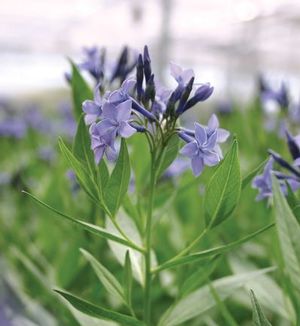New Moon Nurseries
Amsonia tabernemontana 'Blue Ice'
Dwarf blue star
Native to North America (cultivar)
FIRST IMPRESSIONS: If you're looking for a low maintenance perennial with seasonal interest, look no further than Amsonia spp. All members of the Bluestar clan have attractive foliage and blue blossoms in late spring or early summer. 'Blue Ice' Eastern Bluestar is unique in that its flowers are a deeper shade of blue than the other Amsonia cousins. Maybe it should be called the Eastern BluerStar. ‘Blue Ice’ also has a desirable compact growth habit and blue-ish foliage. When not in bloom the foliage is attractive and tidy with golden yellow fall color.
HABITAT & HARDINESS: This selection was found in a nursery block of Amsonia tabernaemontana in a New England nursery. It is suspected to be a hybrid and it is likely that the native Eastern Bluestar (Amsonia tabernaemontana) is one of the parents.
This plant is hardy from USDA Zones 4-9. It grows best in rich well drained soils that are moist but not soggy.
PLANT DESCRIPTION: ‘Blue Ice’ is a compact mounding warm season perennial. Plants are dense and bushy. Height is 1.5’ with a 2-3’ spread. Growth habit and form are uniform due to the fact that this variety is a clone.
Leaves are willow-like with a tinge of blue. In autumn they turn golden yellow. This plant is a textural phenomenon. When planted in masses, the sweeping blue-green foliage is quite striking.
In late spring and early summer dark blue buds open into clouds of starry deep blue flowers. The blossoms are arranged in small rounded clusters. Blooms last for about a month.
CULTURAL & MAINTENANCE NEEDS: ‘Blue Ice’ grows well in sunny or partly shaded sites with moist well drained soil. Established plants are drought tolerant.
Plants are long lived and pest resistant. Stems contain a toxic milky sap which insures that they are not palatable to deer and other herbivores.
Normally special maintenance is not needed. If plants are situated in full shade, however, stems may become weak and need pruning.
LANDSCAPE USES: This is a great plant to mass at the edge of a woodland. It can also be used as an Accent, Butterfly Nectar Plant, Groundcover or as part of a grouping. Plants inject seasonal interest (Fall Color and Showy Blooms) into the garden and are valuable components of Cottage Gardens, Deer Resistant Plantings, Water-wise Landscapes, Low Maintenance Plantings, Meadow or Prairie Gardens, Perennial Borders, Shade Gardens and Wildlife Gardens.
COMPANION & UNDERSTUDY PLANTS: In the woodland garden, this bluestar pairs well with ferns and sedges. In sunny spots, yellow blooming composites like black eyed Susan contrast nicely with the blue foliage and flowers. Lavender and purple fall asters like New England aster or ‘Raydon’s Favorite’ aster are a striking compliment to the golden Amsonia foliage.
Amsonia tabernaemontana could be used as a substitute. Although plants would be taller and coarser in texture with paler flowers.
TRIVIA: A chance seedling is not so unusual among the Amsonias because different species of Bluestar often cross or hybridize.
Height:
15 inSpread:
2 ftUSDA Hardiness Zone:
4-9Bloom Color:
BlueAmsonia tabernemontana 'Blue Ice' Characteristics
Attracts Wildlife
- Pollinators
Attributes
- Drought Tolerant
- Dried Flower
- Cut Flower
- Bog
- Long Blooming
Exposure
- Full Sun
Flowering Months
- June
- May
Foliage Color
- Green
Growth Rate
- Medium
Season of Interest (Foliage)
- Summer
- Spring
- Fall
Soil Moisture Preference
- Moist
